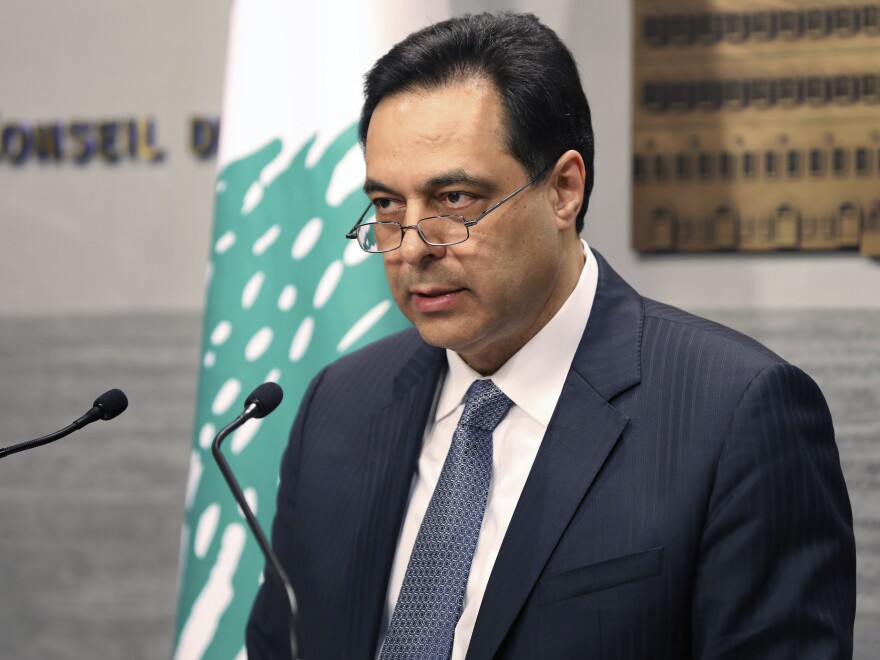Updated at 3:25 p.m. ET
Lebanese Prime Minister Hassan Diab announced his cabinet's resignation Monday, responding to outrage over a catastrophic explosion in Beirut.
"Today I announce the resignation of this government," Diab said in a national TV address. "May God protect Lebanon."
Diab's speech was published by the National News Agency in Lebanon, the state-run media outlet.
His resignation came after last Tuesday's deadly warehouse explosion — caused by 2,750 tons of ammonium nitrate stored at Beirut's port — that killed at least 160 people, wounded thousands and left many homeless, destroying a portion of the city.
Public anger mounted after the blast, focusing on the carelessness that led to one of the worst explosions in Lebanon's history.
The huge trove of dangerous material, which officials say was known about for years, had been allowed to languish in the port since 2013. Intense protests erupted, with many calling for top officials to "resign or hang."
"We are facing an earthquake that struck the country, with all its humanitarian, social, economic and national repercussions," Diab said.
With the prime minister's resignation, it now falls to President Michel Aoun to determine the next steps.
After Diab presented his government's resignation papers to Aoun late Monday, Aoun asked Diab and his ministers to continue performing their duties until a new government is installed, according the presidency's Twitter account.
الرئيس دياب مغادراً قصر بعبدا: الله يحمي لبنان .. "هيدا اللي بقدر قولو" pic.twitter.com/RSrQBLmbyj
— Lebanese Presidency (@LBpresidency) August 10, 2020
Diab, a 61-year-old professor and former minister of education, has only been in the role since January. When he took over, Diab faced many of the same challenges that forced his predecessor, Saad Hariri, to resign. Even before the recent disaster, Lebanon was seeing widespread and persistent protests over allegations of political corruption, and frustration with a deepening economic crisis.
Lebanon has a power-sharing government structure, where different groups are each represented by an arm of the government. The political system mandates that the presidency must go to a Christian, the prime minister must be a Sunni Muslim and the speaker of parliament must be a Shiite Muslim.
This system has been blamed for the country's past political instability and division. NPR has reported the split up nature of Lebanon's system has made it difficult for citizens to organize effectively against leadership — and to secure meaningful political change.
Going forward, one option would be for Lebanon to hold early elections. But Maha Yahya, the director of the Carnegie Middle East Center, said that will not be enough.
"Calling for early elections prior to the explosion on Aug. 4 may have placated people, but not after," Yahya said. "We are way past that. The scale of the tragedy and the depth of the anger is just too much."
The best-case scenario for moving forward, according to Yahya, is that an independent prime minister be named who would undertake economic reforms and "put together an economic and financial rescue plan, but also to prepare for elections next year."
Yahya said the Lebanese people need to have a "roadmap" out of the pain they are experiencing — from the explosion but also from the country's dismal economy.
"You need to explain to people why they're going through this. And those that are responsible will be held accountable," Yahya said. "And you have to show them the way out. You need to show them there's light at the end of the tunnel."
"And given all the questions around the political legitimacy of the current political class, you give them a way to vote them out and vote whoever they think now represents them in."
Copyright 2021 NPR. To see more, visit https://www.npr.org. 9(MDA5NTM4MTIyMDE0MTg3NDc2MTVlZjdmNQ001))



